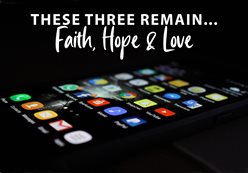Adapting to changing circumstances is nothing new in the advancement of the gospel. When the crowds got too big to hear Jesus speak on land, he went out on the Sea of Galilee in a fishing boat so everyone could hear him. People gathered on top of houses to listen to Jesus teach and because of his lack of height, Zacchaeus climbed a tree.
Before I offer some tips and advice, I want to celebrate how churches have engaged digitally in some very creative ways throughout the coronavirus pandemic. From sharing testimonies, short Bible devotions, to staying in touch with church members and the wider public, a strong presence on social media has been grown.
2 Thessalonians 2:16-17: May our Lord Jesus Christ himself and God our Father, who loved us and by his grace gave us eternal encouragement and good hope, encourage your hearts and strengthen you in every good deed and word.
Hopefully this blog will provide some further ideas and guidance to experiment with in the coming months.
Which channel to use?
 Twitter is the gospel of Mark of all the social media channels - it is short and snappy and limits you to say what you want within 280 characters. However, it’s not the best platform for video as clips are limited to just over two minutes if uploaded directly. On Facebook, people and congregations can easily share posts, links and videos which enable them to be seen by more people. Instagram is purely image and video led and tends to have a younger demographic than Facebook. Lately, You Tube has become more popular to host church services on and the premier function helps to ‘go live’ at your normal Sunday service time.
Twitter is the gospel of Mark of all the social media channels - it is short and snappy and limits you to say what you want within 280 characters. However, it’s not the best platform for video as clips are limited to just over two minutes if uploaded directly. On Facebook, people and congregations can easily share posts, links and videos which enable them to be seen by more people. Instagram is purely image and video led and tends to have a younger demographic than Facebook. Lately, You Tube has become more popular to host church services on and the premier function helps to ‘go live’ at your normal Sunday service time.
Get to know a social media channel well as an individual user before you start posting as an organisation. Find out what other organisations post and what content gets a good response. This will help you understand limitations and also see frustrations that you can avoid where possible.
Don’t feel overwhelmed by them all - you or your church do not have to be on every channel - this is neither sustainable nor a good use of your time especially if you are overseeing everything as the minister. Find others in the church that have skills and can be trusted with looking after content. If your church isn’t on any platform yet, perhaps start with a Facebook presence and concentrate on that before branching out into others.
Plan out your content
It is only natural for Sunday to be the day when there is a lot of content published by churches. Try and spread it out over the week where you can to fill the days. Try and leave space between posts so each gets a fair chance at being seen by your followers. Use the Creator Studio function in Facebook to schedule and spread out posts and trial different times of the day to see what generates more impact.
If you do struggle with generating posts, then I would encourage you to share PCI content from their social media channels, such as the daily Let’s Pray prayer points, twice weekly These Three Remain blog articles, podcast links and other resources designed and created for these times.
Don’t be afraid to rest and have a day when there is no content. God ordains a day of rest for us as humans and so we need to do the same with our social media platforms and let people digest the current content. We can also get fixated with checking stats as administrators so it is wise to take a break from this too.
Don’t get too excited about numbers and You Tube viewing figures. You may have 1,000 people following your church page on Facebook but don’t forget to connect on a one-to-one basis with your faithful church members who normally sit in your pews. People are not going to post a comment that they are struggling for the whole world to see online, but they may express their worries if they get a phone call from a minister or an elder and that can lead to prayer over the phone. Pastoral care by elders can be easily done via telephone calls (a previous blog addresses this in more detail, you can read it here).
Be flexible
Unlike formal event based programmes churches are familiar running, you can start a mini-series on social media without having to commit and if it’s not working, try something else. The flexibility allows you to be creative and respond to the current situation. This frees you up from having to constantly deliver.
Don’t be shy about video
Standards aren’t as high as they used to be pre-Covid as we see BBC journalists report live from their living rooms and back gardens. This helps as we don’t have to have a fancy studio to get started. Make sure there is nothing distracting is in your background and face a window to have light on your face. More tips are available from a Belfast videographer here along with links to other articles with more specific tips about recording services online.
Try and engage your congregation to take part. People miss seeing each other, so asking families to upload short videos that can be incorporated into the Sunday service is a great way to stay connected.
You could ask different people to share their favourite Bible verse or Psalm, or even how they came to faith. Allowing people to be honest helps others to see the Christian walk isn’t easy at times and can draw others to Christ.
As we move into the next phase and churches open their doors and host services again, you could involve those that will choose to stay at home, perhaps for health reasons, and get them to record a Bible reading, a prayer or playing a musical item to play on Sunday in the service.
Ponder a podcast
Another option for recording the Sunday service is by using a podcast. It’s like radio in that it is audio focused and can be useful for those shy about being in front of a camera. Other ways of using a podcast is to record interviews with different people in your congregation about how they are coping, even about their testimony and how they came to faith.
If you haven’t already listened to the These Three Remain weekly podcast for stories of faith, hope and love across PCI, then do listen in for specific ideas other churches have embraced and experimented with.
Be thankful
Rather than compare your social media reach and likes to neighbouring churches, be thankful for those that have engaged with your content. Respond to those that leave comments where possible and pray that God would bless the seed that has been sown. As in all ministries, we do not know the full extent of what we say to others and how it impacts their faith journey. God is always working in our waiting and in ways we can never see nor understand.
And remember, after Jesus preached out on the boat, the fishermen caught so many fish the boat was on the verge of sinking!
 Rebecca McConnell a member of First Rathfriland Presbyterian Church and a PR and social media consultant.
Rebecca McConnell a member of First Rathfriland Presbyterian Church and a PR and social media consultant.
This blog is part of a wider series under the campaign, These Three Remain to help members and congregations during the Coronavirus pandemic.
Visit the These Three Remain hub here.